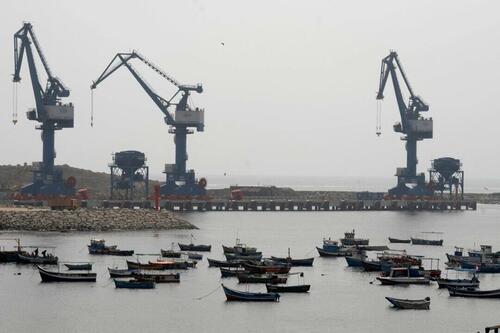
Authored by Antonio Graceffo via The Epoch Times,
The new Chinese-controlled port in Peru is part of Chinese leader Xi Jinping’s strategy to outflank the United States by establishing a maritime and land corridor linking China to Latin America.
As the Biden administration winds to a close, the Chinese Communist Party (CCP) is aggressively expanding its influence in South America. On Nov. 14, Xi Jinping and Peruvian President Dina Boluarte inaugurated a $3.6 billion port in Chancay, Peru, marking another major step in China’s economic foothold in the region.
Earlier this year, Boluarte traveled to Beijing to strengthen Sino–Peruvian ties, cementing Peru’s position as the second-largest recipient of Chinese foreign direct investment in Latin America. Notably, this includes China Southern Power Grid’s acquisition of Peru’s electricity distribution, placing 100 percent of this critical infrastructure under CCP control.
In stark contrast, the White House failed to engage Boluarte during her 2023 visit to Washington, missing a key opportunity to counter Beijing’s growing influence. The port inauguration coincided with the Asia-Pacific Economic Cooperation (APEC) summit in Lima, where U.S. President Joe Biden and leaders from 21 member economies convened. The timing underscores a stark reality: while the United States watched from the sidelines, the CCP was actively drawing Latin America deeper into its orbit, delivering a clear and humiliating message to the United States about its waning influence in the region.
The Chinese shipping giant COSCO owns a 60 percent stake in Peru’s Chancay port, which will serve as a critical node in China’s Belt and Road Initiative and its first logistics hub in the Americas. Strategically positioned, the port grants China access to Peru’s abundant copper reserves—essential for dominating global markets in electric vehicles and data centers. Equipped with cutting-edge technology, including automated cranes and driverless electric trucks, the port’s scale and proximity to the United States have raised serious concerns about potential military use by the Chinese People’s Liberation Navy.
Gen. Laura J. Richardson, then-commander of U.S. Southern Command, warned Congress that while the port is officially designated for commercial purposes, its size and capabilities could accommodate military assets, including combat vessels. She emphasized that China, as a strategic competitor, undermines international norms and democratic values in Latin America and the Caribbean. Through corruption, disinformation, cybercrime, and human rights abuses, the CCP bolsters authoritarian regimes in countries like Cuba, Nicaragua, and Venezuela to further its geopolitical agenda.
While China deepens its regional foothold, the United States has pressured Boluarte on human rights abuses and democratic violations, contrasting with Beijing’s hands-off approach. Beijing openly supported Venezuela’s Nicolás Maduro after his contested election victory in July, despite widespread allegations of fraud by international observers. The fraudulent election sparked massive protests across Venezuela, met with a violent crackdown by Maduro’s regime. Security forces used tear gas, rubber bullets, and live ammunition to suppress dissent, resulting in at least 23 deaths and more than 2,200 arrests. The brutal suppression drew international condemnation, further isolating Maduro’s regime, yet China’s backing reinforced its alignment with authoritarian leaders in the region.
China’s investments in dual-use infrastructure, such as ports, telecommunications, and space facilities, extend well beyond commercial purposes. Deep-water ports like the proposed maritime facilities in Argentina could serve as future naval access points for the People’s Liberation Army. These strategic installations, including projects near the Panama Canal and Antarctica, create chokepoints that enhance Beijing’s global power projection capabilities.
These ports also enable the CCP to monitor U.S. naval and commercial ships, with the potential to restrict their access to vital waterways. Additionally, Chinese state-owned enterprises like Nuctech and ZPMC, which operate in Chancay and other Latin American and Caribbean ports, could leverage port scanning equipment and cargo cranes to gather sensitive commercial data from allies and adversaries alike. Similar concerns have been raised regarding Chinese-built ports in Africa, the Middle East, and Southeast Asia, underscoring the broader risks of China’s expanding infrastructure network.
In the Western Hemisphere, Chinese state-owned companies have financed, built, or now operate several key ports along strategic waterways, including the Panama Canal and the Caribbean Sea. In Argentina, China recently attempted to develop a naval base near the Strait of Magellan and Antarctica, but President Javier Milei opted in April to partner with the United States for the project instead.
These Chinese-controlled ports pose significant challenges for U.S. military operations. In a potential conflict, such as one in the Taiwan Strait or South China Sea, the U.S. Navy may need to quickly move ships between the Atlantic and Pacific through critical chokepoints like the Panama Canal or the Strait of Magellan. Chinese companies managing these infrastructures could delay or obstruct U.S. movements.
Major Chinese shipping and port management companies, including COSCO, operate under heavy influence from the CCP. With many top executives holding CCP membership and China’s 2017 National Security Law requiring companies to prioritize national security interests, the CCP wields significant control over these operations. This allows Beijing to strategically leverage these assets to support its geopolitical objectives.
Telecommunications is another key area in which China has established a stronghold in Latin America. Companies like Huawei and ZTE have implemented network infrastructure across nearly every country in the region, raising serious cybersecurity concerns. Meanwhile, China has also expanded its presence in space, building at least 10 facilities in Latin America—the largest concentration outside its mainland. These installations bolster the People’s Liberation Army’s global surveillance and military capabilities, presenting a direct threat to U.S. security.
Numerous Republicans, including former presidential candidate Vivek Ramaswamy, Florida Gov. Ron DeSantis, and Sen. Jim Risch (R-Idaho), highlighted the urgent need to revive the Monroe Doctrine—a U.S. policy established in 1823 to oppose foreign interference in the Western Hemisphere—in response to mounting threats from the CCP. They warn that the Chinese regime is aggressively expanding its influence in Latin America, backing authoritarian regimes, infiltrating markets, and undermining regional sovereignty, posing a direct challenge to U.S. security.
Risch called on the White House to recognize the stakes, as failure to act will leave the United States increasingly vulnerable. In his view, reviving the Monroe Doctrine isn’t just historical—it’s essential for modern security.
Views expressed in this article are opinions of the author and do not necessarily reflect the views of The Epoch Times or ZeroHedge.
Authored by Antonio Graceffo via The Epoch Times,
The new Chinese-controlled port in Peru is part of Chinese leader Xi Jinping’s strategy to outflank the United States by establishing a maritime and land corridor linking China to Latin America.
As the Biden administration winds to a close, the Chinese Communist Party (CCP) is aggressively expanding its influence in South America. On Nov. 14, Xi Jinping and Peruvian President Dina Boluarte inaugurated a $3.6 billion port in Chancay, Peru, marking another major step in China’s economic foothold in the region.
Earlier this year, Boluarte traveled to Beijing to strengthen Sino–Peruvian ties, cementing Peru’s position as the second-largest recipient of Chinese foreign direct investment in Latin America. Notably, this includes China Southern Power Grid’s acquisition of Peru’s electricity distribution, placing 100 percent of this critical infrastructure under CCP control.
In stark contrast, the White House failed to engage Boluarte during her 2023 visit to Washington, missing a key opportunity to counter Beijing’s growing influence. The port inauguration coincided with the Asia-Pacific Economic Cooperation (APEC) summit in Lima, where U.S. President Joe Biden and leaders from 21 member economies convened. The timing underscores a stark reality: while the United States watched from the sidelines, the CCP was actively drawing Latin America deeper into its orbit, delivering a clear and humiliating message to the United States about its waning influence in the region.
The Chinese shipping giant COSCO owns a 60 percent stake in Peru’s Chancay port, which will serve as a critical node in China’s Belt and Road Initiative and its first logistics hub in the Americas. Strategically positioned, the port grants China access to Peru’s abundant copper reserves—essential for dominating global markets in electric vehicles and data centers. Equipped with cutting-edge technology, including automated cranes and driverless electric trucks, the port’s scale and proximity to the United States have raised serious concerns about potential military use by the Chinese People’s Liberation Navy.
Gen. Laura J. Richardson, then-commander of U.S. Southern Command, warned Congress that while the port is officially designated for commercial purposes, its size and capabilities could accommodate military assets, including combat vessels. She emphasized that China, as a strategic competitor, undermines international norms and democratic values in Latin America and the Caribbean. Through corruption, disinformation, cybercrime, and human rights abuses, the CCP bolsters authoritarian regimes in countries like Cuba, Nicaragua, and Venezuela to further its geopolitical agenda.
While China deepens its regional foothold, the United States has pressured Boluarte on human rights abuses and democratic violations, contrasting with Beijing’s hands-off approach. Beijing openly supported Venezuela’s Nicolás Maduro after his contested election victory in July, despite widespread allegations of fraud by international observers. The fraudulent election sparked massive protests across Venezuela, met with a violent crackdown by Maduro’s regime. Security forces used tear gas, rubber bullets, and live ammunition to suppress dissent, resulting in at least 23 deaths and more than 2,200 arrests. The brutal suppression drew international condemnation, further isolating Maduro’s regime, yet China’s backing reinforced its alignment with authoritarian leaders in the region.
China’s investments in dual-use infrastructure, such as ports, telecommunications, and space facilities, extend well beyond commercial purposes. Deep-water ports like the proposed maritime facilities in Argentina could serve as future naval access points for the People’s Liberation Army. These strategic installations, including projects near the Panama Canal and Antarctica, create chokepoints that enhance Beijing’s global power projection capabilities.
These ports also enable the CCP to monitor U.S. naval and commercial ships, with the potential to restrict their access to vital waterways. Additionally, Chinese state-owned enterprises like Nuctech and ZPMC, which operate in Chancay and other Latin American and Caribbean ports, could leverage port scanning equipment and cargo cranes to gather sensitive commercial data from allies and adversaries alike. Similar concerns have been raised regarding Chinese-built ports in Africa, the Middle East, and Southeast Asia, underscoring the broader risks of China’s expanding infrastructure network.
In the Western Hemisphere, Chinese state-owned companies have financed, built, or now operate several key ports along strategic waterways, including the Panama Canal and the Caribbean Sea. In Argentina, China recently attempted to develop a naval base near the Strait of Magellan and Antarctica, but President Javier Milei opted in April to partner with the United States for the project instead.
These Chinese-controlled ports pose significant challenges for U.S. military operations. In a potential conflict, such as one in the Taiwan Strait or South China Sea, the U.S. Navy may need to quickly move ships between the Atlantic and Pacific through critical chokepoints like the Panama Canal or the Strait of Magellan. Chinese companies managing these infrastructures could delay or obstruct U.S. movements.
Major Chinese shipping and port management companies, including COSCO, operate under heavy influence from the CCP. With many top executives holding CCP membership and China’s 2017 National Security Law requiring companies to prioritize national security interests, the CCP wields significant control over these operations. This allows Beijing to strategically leverage these assets to support its geopolitical objectives.
Telecommunications is another key area in which China has established a stronghold in Latin America. Companies like Huawei and ZTE have implemented network infrastructure across nearly every country in the region, raising serious cybersecurity concerns. Meanwhile, China has also expanded its presence in space, building at least 10 facilities in Latin America—the largest concentration outside its mainland. These installations bolster the People’s Liberation Army’s global surveillance and military capabilities, presenting a direct threat to U.S. security.
Numerous Republicans, including former presidential candidate Vivek Ramaswamy, Florida Gov. Ron DeSantis, and Sen. Jim Risch (R-Idaho), highlighted the urgent need to revive the Monroe Doctrine—a U.S. policy established in 1823 to oppose foreign interference in the Western Hemisphere—in response to mounting threats from the CCP. They warn that the Chinese regime is aggressively expanding its influence in Latin America, backing authoritarian regimes, infiltrating markets, and undermining regional sovereignty, posing a direct challenge to U.S. security.
Risch called on the White House to recognize the stakes, as failure to act will leave the United States increasingly vulnerable. In his view, reviving the Monroe Doctrine isn’t just historical—it’s essential for modern security.
Views expressed in this article are opinions of the author and do not necessarily reflect the views of The Epoch Times or ZeroHedge.
Loading…






